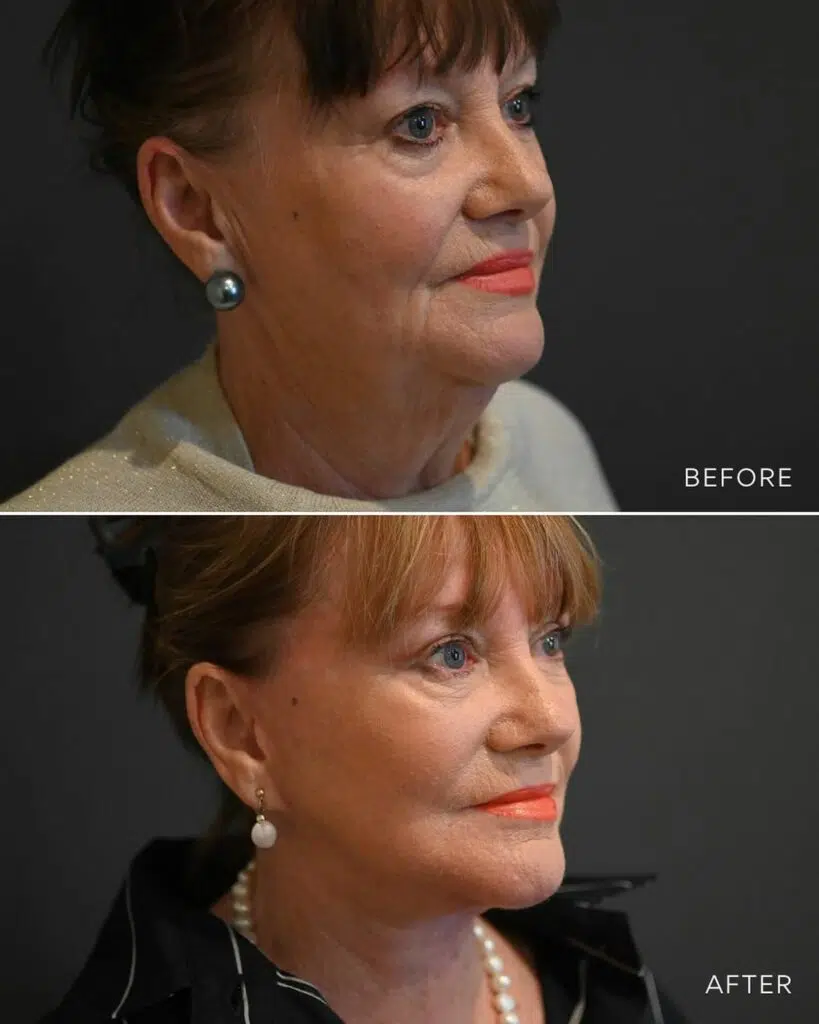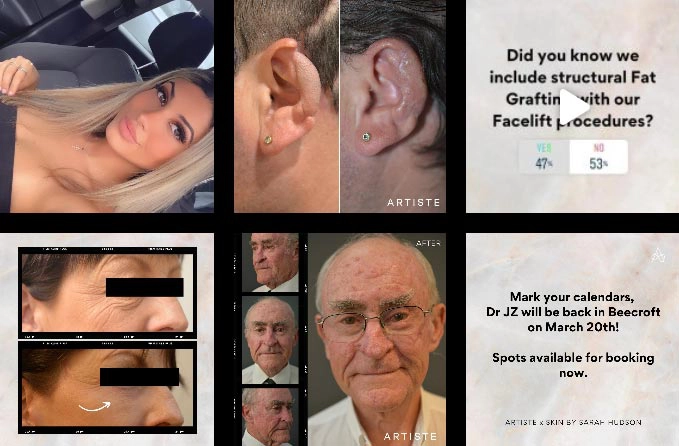Treatments To Get Rid Of Neck Jowls
Model featured in photography

Disclaimer: Results vary and are illustrated as a guide only.
As we age, one of the most common cosmetic concerns that many people face is the development of jowls. While they are a natural part of the ageing process, there are several treatments available to help reduce their appearance and restore a more youthful-looking contour. In this blog, we’ll explore what jowls are, their causes, and the various treatment options available.
What Are Jowls?
Jowls refer to the sagging skin and tissues that develop along the jawline and neck as we age. They are often most noticeable in the lower cheeks and along the jawline, where the skin begins to lose its firmness and elasticity. The appearance of jowls can vary from person to person, depending on factors like genetics, lifestyle, and overall health.
Causes of Jowls
- Ageing: As we age, the skin naturally loses collagen and elastin, proteins responsible for maintaining skin elasticity and firmness, leading to sagging and the formation of jowls.
- Genetics: Some people are genetically predisposed to developing jowls earlier or more prominently than others. Family history can play a significant role in how and when jowls appear.
- Sun Exposure: Prolonged exposure to UV rays damages skin cells and accelerates the breakdown of collagen and elastin, leading to premature ageing and sagging skin.
- Weight Fluctuations: Significant changes in weight can stretch the skin, and when weight is lost, the skin may not return to its original firmness, contributing to sagging.
- Lifestyle Factors: Smoking, poor diet, and lack of exercise can negatively affect skin health and accelerate the ageing process, contributing to the development of jowls.
Quick Fix for Preventing Jowls
Neck and jowl tightening exercises can be a valuable addition to your routine for maintaining muscle tone and potentially reducing the appearance of sagging in the neck and jawline. Simple moves, like tilting your head back and making a chewing motion, chin tucks, and jawline pushes, target these areas to improve firmness and elasticity.
Non-Surgical Treatments
Non-surgical treatments are an attractive option for those seeking to improve the appearance of jowls without undergoing surgery. These treatments typically involve minimal downtime and are less invasive. Here are three popular non-surgical options:
1. Ultrasound Therapy
Ultrasound therapy uses focused energy to stimulate collagen production deep within the skin. This non-invasive treatment helps lift and tighten the skin over time, resulting in a more youthful appearance.
2. Radiofrequency Therapy
Radiofrequency therapy involves using energy to heat the skin’s deeper layers, promoting collagen production and tightening the skin. It’s a painless procedure with minimal downtime and can effectively reduce the appearance of jowls.
3. Injectable Fillers
Injections for Augmentation can be strategically injected to restore volume and lift sagging areas around the jawline. Fillers provide immediate results, although they are temporary and typically last from six months to a year.
Surgical Treatments
For those seeking more dramatic and long-lasting results, surgical options may be appropriate. Surgical procedures offer comprehensive solutions to address significant sagging and loss of definition in the jawline and neck area:
1. Neck Lift
A neck lift, or lower rhytidectomy, is a surgical procedure that removes excess skin and tightens underlying muscles in the neck and jawline. This procedure provides significant and lasting improvements, but requires a longer recovery period.
2. Liposuction
Neck liposuction can be used to remove excess fat deposits under the chin and along the jawline. This procedure is often combined with other surgical treatments for optimal contouring of the neck area.
3. Facelift
A facelift targets the lower face and neck, removing excess skin and tightening underlying tissues to address sagging jowls and other signs of ageing. It is a more comprehensive approach that delivers significant and long-lasting results.
What is the best treatment for neck jowls?
Whether you opt for non-surgical methods or consider surgical procedures, it’s important to know that all procedures may have potential risks and complications. Some patients undergo a combination of procedures to eliminate jowls. It is important to consult with a qualified dermatologist or plastic surgeon to explore your options and make an informed decision.
If you want to know more about the most suited option for you, reach out to Artiste Plastic Surgery. Our Specialist Plastic Surgeon, Dr Jack Zoumaras, will evaluate your needs and develop a personalised treatment plan. Schedule a consultation today.
Disclaimer: At Artiste Plastic Surgery, our Plastic Surgeons led by Dr Jack Zoumaras have been trained to the highest possible degree. All surgery has risks and it is always advised to get a second opinion. Risks are very real and we cannot guarantee any result. Results are illustrated as a guide only. All risks are managed and any need for revision surgery or complications (1-5%) can be managed by our specialist plastic surgeons.
Any statements on how you will feel is based on Level V Evidence:
Level V: How you will feel after plastic surgery varies between individuals, depending on psychological and physical factors. Our internal research is based on how patients in our practice feel after surgery.
The blogs are not a substitute for a medical consultation and do not form as part of the doctor to patient relationship.
SHARE THIS ARTICLE
Apr16
How Facelifts Can Help With Smile Lines
Smile or laugh lines, also known as nasolabial folds, are the creases that extend from the sides of the nose to the corners of the mouth. These lines are a ...
Apr16
Costs Of Different Types Of Neck Lift Procedures
Neck lift procedures are sought by individuals looking for surgical options to address loose skin, excess fat, or muscle laxity around the jawline and neck area. While these procedures can ...
ABOUT ARTISTE
Artiste Plastic Surgery is an Award Winning Specialist Plastic Surgery practice led by internationally trained Dr. Jack Zoumaras, Plastic Surgeon and Peer Reviewed Face Surgeon
Artiste offers the latest Cosmetic Surgical Procedures of the Face, Breast and Body, inspired from leading centres around the world.
STAY IN THE LOOP
Enter your email address below to receive updates on new articles and VIP access to promotions and special offers.
FOLLOW US ON INSTAGRAM







